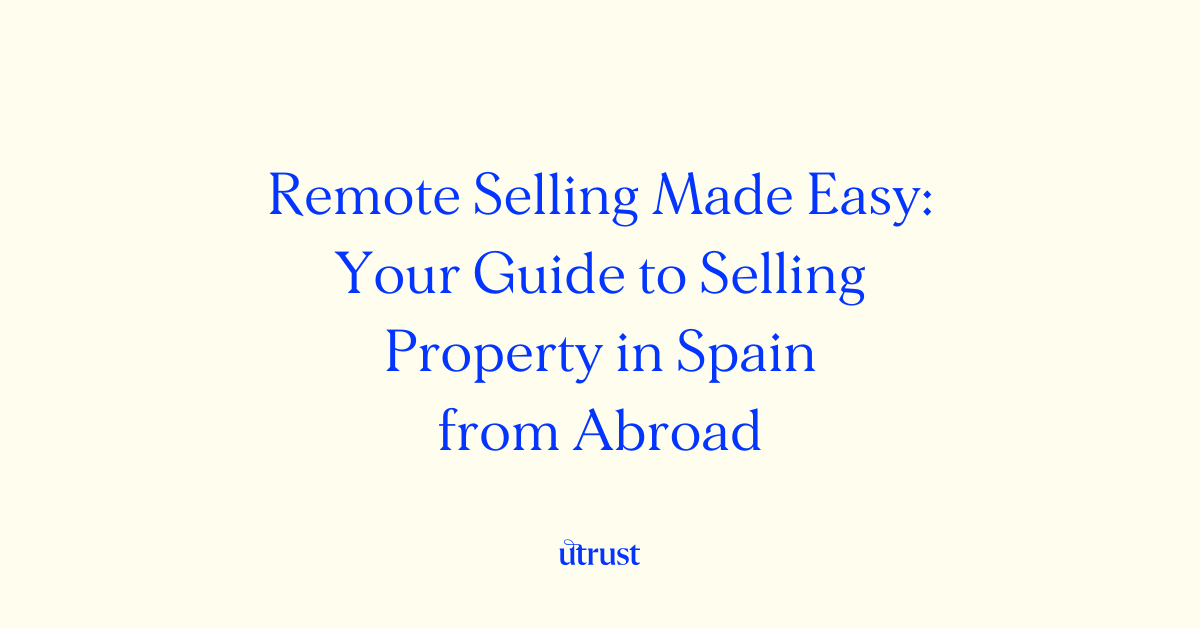Learn how to sell your house in Spain remotely with our comprehensive guide. From granting power of attorney to understanding tax obligations, we've got you covered.
If you're considering selling your property in Spain but want to avoid the hassle of traveling, this guide will help you understand the process. When selling property in Spain from abroad, it's important to take certain steps to ensure a smooth process:
- Granting power of attorney to a property lawyer can streamline the process by allowing them to act on your behalf.
- You need to make sure your NIE (foreigner identification number) is valid. If you don’t have it or it has to be updated, UTRUST can handle this for you.
- Make sure you understand the taxes you may need to pay. Our team at UTRUST will help you throughout the process.
Power of Attorney: The Most Common Method for Overseas Property Sales in Spain
The initial step involves granting power of attorney (POA), enabling an independent lawyer to oversee the sale process. This method is highly advantageous for managing legal affairs remotely, as it delegates necessary procedures to a trusted expert located near the property being sold. Signing a power of attorney is also remarkably convenient for our clients, ensuring smooth transaction and peace of mind.
Understanding Tax Obligations for Selling Property in Spain
When selling property in Spain, two main taxes need consideration: Plusvalía and Capital Gains Tax.
Plusvalía:
Capital Gains Tax:
Plusvalía:
- This municipal tax, paid to the town hall, is calculated based on the increase in the official land value between purchase and sale. The tax amount varies, as it factors in property cadastral value and ownership duration. Here's what you need to know:
- The tax amount is determined by the property's cadastral value at the time of sale, as indicated on the Rates bill issued by the local Town Hall. This value is then multiplied by an annual rate set by the local municipal council.
- The number of years you have owned the property significantly impacts the Plusvalía tax. The longer the ownership period, the higher the potential tax.
- If the seller is a non-resident, the buyer is responsible for paying the Plusvalía tax. Therefore, the buyer may retain the calculated tax amount from the purchase price to cover this obligation.
Capital Gains Tax:
- This tax is collected by the National Tax Office (Agencia Tributaria), and fluctuates based on residency status and duration of ownership, spanning from 19% to 23%. Key points include:
- Non-residents outside the EU face a fixed 24% rate, reduced to 19% for EU, Norway, or Iceland residents.
- Spanish residents adhere to progressive rates, with exemptions available for reinvestment or age-based criteria.
- The possibility to reinvest the sale proceeds is available only for residents.
- You cannot deduct the cost of all repairs or refurbishments, a lawyer should review which repairs are deductable and which ones are not.
At UTRUST, we specialize in guiding international investors through the process of selling property in Spain remotely. Our experienced team understands the unique challenges and opportunities involved in overseas property sales and will tailor strategies to suit your specific requirements.
For a complimentary consultation and personalized assistance with your property sale, please don't hesitate to contact us at info@utrust.es.
